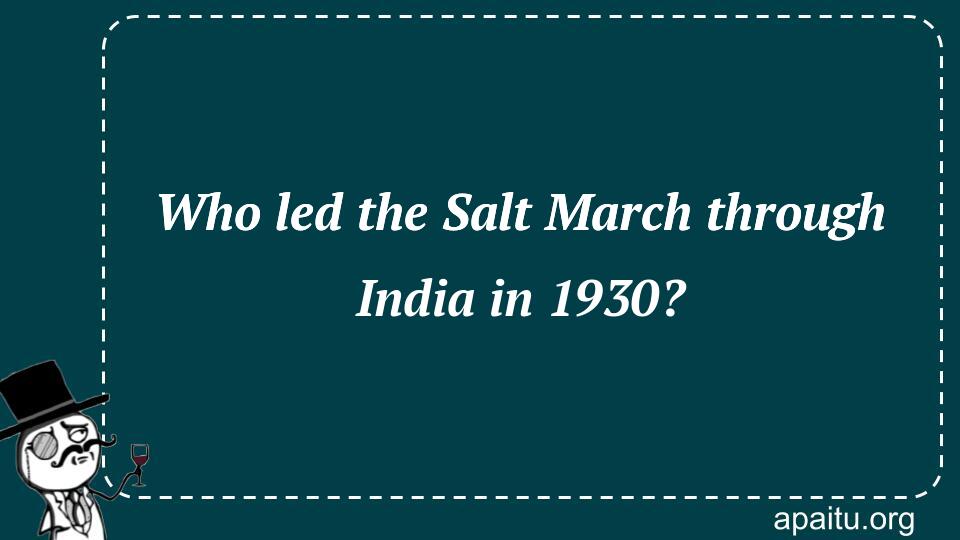Question
Here is the question : WHO LED THE SALT MARCH THROUGH INDIA IN 1930?
Option
Here is the option for the question :
- Mother Teresa
- Jawaharlal Nehru
- Lakshmi Bai
- Mahatma Gandhi
The Answer:
And, the answer for the the question is :
Explanation:
In March and April of 1930, Mahatma Gandhi conducted a campaign of civil disobedience known as the Salt March. Thousands of people, led by Gandhi, marched 240 miles across India in protest against British tyranny. Many protesters, including Gandhi, were arrested, but the campaign they sparked led to India’s independence in 1947.

In 1930, Mahatma Gandhi led the Salt March, also known as the Dandi March, which was a significant event in India’s struggle for independence from British colonial rule. The Salt March was a nonviolent protest against the British salt tax, which had a significant impact on India’s economy and was viewed as a symbol of British oppression.
The Salt March began on March 12, 1930, when Gandhi and a group of followers set out on a 24-day, 240-mile journey from Sabarmati Ashram in Ahmedabad to the coastal town of Dandi in Gujarat. Along the way, Gandhi gave speeches and rallied support for the cause of Indian independence.
On April 6, 1930, Gandhi and a crowd of supporters reached the shores of Dandi and proceeded to break the British salt laws by collecting and boiling salt from the sea. This act of civil disobedience sparked a wave of protests and demonstrations throughout India, as people rallied behind Gandhi’s call for independence.
The Salt March was a turning point in India’s struggle for independence, as it brought international attention to the cause and inspired millions of Indians to join the fight against British colonial rule. The nonviolent tactics employed by Gandhi and his followers were instrumental in the success of the movement, as they demonstrated the power of peaceful resistance in the face of oppression.
Gandhi’s leadership and commitment to nonviolence were crucial to the success of the Salt March and the broader independence movement. His philosophy of Satyagraha, which emphasized the power of truth and nonviolent resistance, inspired countless individuals around the world and continues to be a guiding principle for social justice movements today.
the Salt March led by Mahatma Gandhi in 1930 was a pivotal moment in India’s struggle for independence from British colonial rule. Through nonviolent protest and civil disobedience, Gandhi and his followers demonstrated the power of peaceful resistance and inspired millions of Indians to join the fight for independence. The legacy of the Salt March and Gandhi’s leadership continues to inspire social justice movements around the world, serving as a reminder of the power of nonviolence in the face of oppression.